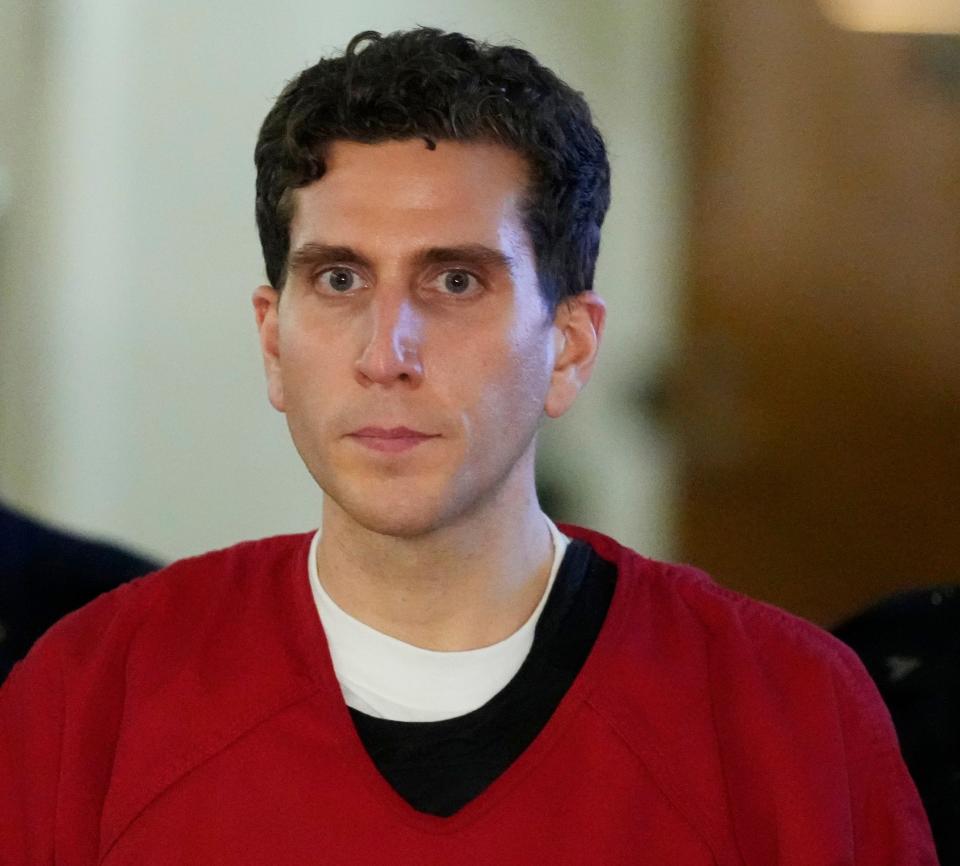Grand jury indicts Bryan Kohberger in stabbing deaths of 4 University of Idaho students
A Ph.D. criminology student accused of fatally stabbing four University of Idaho students in November has been indicted by a grand jury and will appear for arraignment on Monday to enter a plea.
Bryan Kohberger, 28, has already been charged directly by prosecutors, but a grand jury indictment allows the case to be transferred directly to a higher-level court in Moscow, Idaho. It also allows prosecutors to keep more of their evidence secret until trial.
The grand jury indictment is for the same charges Kohberger was already facing, although more could be filed, Latah County Court Deputy Clerk Charlotte Mansil said Wednesday. Kohberger remains jailed without bond.
"He was indicted on the original charges and the preliminary hearing set for the end of June was vacated. His arraignment is now going to be in person on May 22 at 9 a.m. in Courtroom 3," Mansil said.
Authorities say DNA evidence left at the scene ties Kohberger to the deaths of Ethan Chapin, 20, Madison Mogen, 21, Kaylee Goncalves, 21, and Xana Kernodle, 20, whose bodies were found by another roommate on Nov. 13.
What will happen at arraignment?
In Idaho, defendants who are charged directly by prosecutors undergo a preliminary hearing in which a judge publicly hears evidence and decides whether there's enough to proceed to trial. A grand jury indictment allows prosecutors to skip that public hearing.
On Monday, court officials said, Kohberger will appear before a new judge − his case has been transferred from county to district court − to enter a plea to the charges. That new judge will also schedule new hearings about how to proceed.
Prosecutors and juries often bring multiple versions of the same charges against a defendant, meaning Kohberger could still be charged with additional counts such as second-degree murder, stalking, or theft.
Prosecutors and defense attorneys have also been jockeying over whether all evidence has been made available to both sides and have filed several motions to address that.
What about the gag order?
A coalition of media organizations is asking the court to overturn or narrow a sweeping gag order limiting police, attorneys and many government officials and family members from speaking publicly about the case. The judge who issued that order on Wednesday declined to alter or remove it in advance of the Monday hearing.
Before the gag order, police also said cellphone records and security camera footage placed Kohberger in the area.
"The gag order, which is based on the parties’ stipulation, rests merely on an assumption that press coverage is bad," attorney Wendy Olson wrote in asking a judge to reconsider. "The U.S. Constitution and the Idaho Constitution demand more."
Kohberger's attorneys opposed the request and said they needed more time to prepare for the hearing and demonstrate how he would be harmed by increased press scrutiny. Court records indicate that prosecutors have not weighed in on the request.

TIMELINE OF SLAYINGS: A mystery, no leads, then a break in the case: Timeline of the Idaho student murders investigation
The sweeping gag order prevents police and attorneys from discussing the case. But media organizations argue it has also improperly prevented authorities from answering basic questions about Kohberger's jail cell or whether investigators are reviewing any cold case files in light of his arrest, and it has scared the victims' family members into staying silent instead of talking about their loved ones.
The four victims were remembered on May 13 at the University of Idaho's commencement, and each was posthumously awarded their degrees or certificates.
Death penalty on the table
If convicted, Kohberger could face the death penalty, which is legal in Idaho. Investigators have not yet revealed a potential motive behind the killings, although the father of one of the victims said he believes Kohberger was stalking her. A surviving roommate said she saw a tall, thin masked man with bushy eyebrows inside the house after hearing noises coming from another bedroom.
How did authorities ID suspect?
Investigators used DNA samples and surveillance footage, cellphone tracking software, and trash taken from Kohberger's family's home in Pennsylvania to identify him as the suspect, according to court documents.
A police search warrant revealed that Kohberger's phone had been tracked near the students' house at least 12 times in the six months before the attack. Kohberger was enrolled in a Ph.D. criminology program across the nearby state line in Washington.
Kohberger was taken into custody on Dec. 29 in his parents' home in northeastern Pennsylvania, about 2,500 miles from where the stabbings occurred.
This article originally appeared on USA TODAY: Bryan Kohberger indicted in deaths of 4 University of Idaho students

